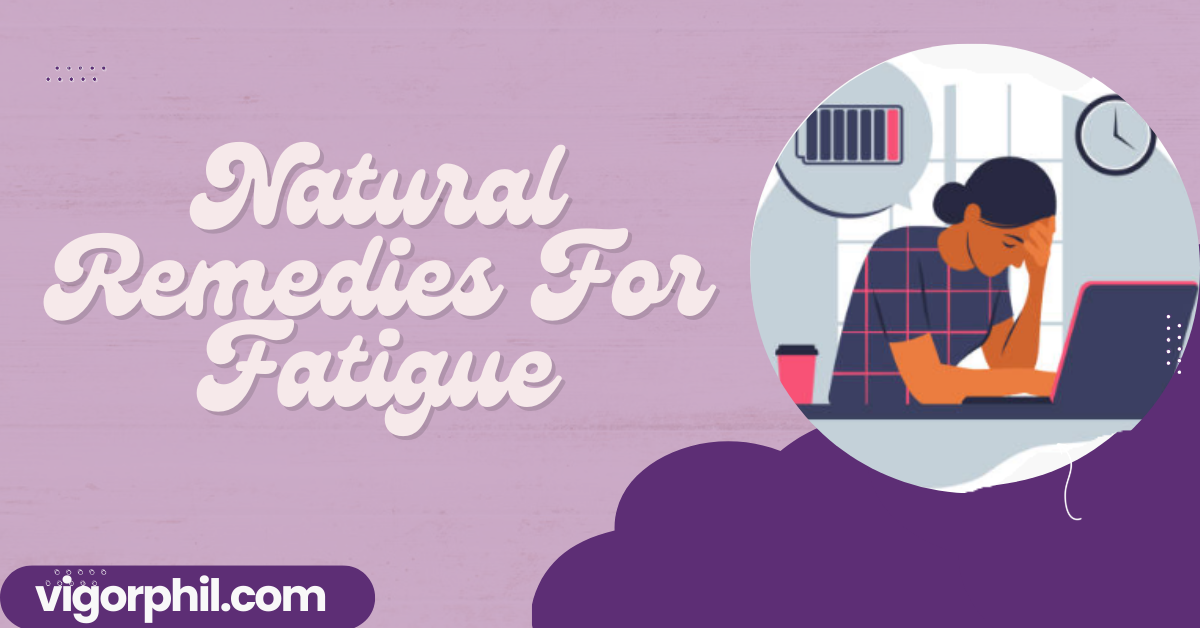Do you often feel tired and lacking energy, even after a good night’s sleep? Fatigue can be a common complaint for many individuals, and it can affect daily life in various ways, from decreased productivity to increased irritability. While there are many possible causes of fatigue, such as underlying medical conditions or poor sleep habits, natural remedies can help alleviate some symptoms and promote overall wellness.
This article will discuss various natural remedies that can help fight fatigue, including dietary changes, exercise, sleep hygiene, stress management, and herbal supplements. By incorporating these remedies into your daily routine, you may be able to improve your energy levels and enjoy a more fulfilling life.
Diet Changes
One of the most important factors that can contribute to fatigue is an imbalanced diet. If your body isn’t receiving the proper nutrients it needs, it can lead to decreased energy levels and feelings of exhaustion. To combat this, it’s crucial to maintain a balanced diet that includes a variety of foods from all food groups.
Protein is essential for providing sustained energy, as it helps to stabilize blood sugar levels and keep you feeling fuller for longer. Foods that are high in protein include lean meats, fish, eggs, dairy products, beans, and nuts. In addition, complex carbohydrates are an important source of energy for the body, as they release glucose slowly and provide a steady source of fuel. Examples of complex carbohydrates include whole grains, fruits, vegetables, and legumes.
Iron and B vitamins are also crucial for energy production, as they help to transport oxygen and nutrients throughout the body. Good sources of iron include red meat, poultry, seafood, beans, and leafy green vegetables, while B vitamins can be found in whole grains, dairy products, eggs, and leafy green vegetables.
list of foods that can help fight fatigue
In addition to maintaining a balanced diet, there are specific foods that can help fight fatigue and boost energy levels. Here are some foods to include in your diet:
- High-Protein Foods: As mentioned earlier, protein is essential for providing sustained energy and stabilizing blood sugar levels. Some high-protein foods include lean meats, fish, eggs, dairy products, beans, and nuts. These foods can help you feel fuller for longer and provide a steady energy source throughout the day.
- Complex Carbohydrates: Complex carbohydrates release glucose slowly and provide a steady source of fuel for the body. Examples of complex carbohydrates include whole grains, fruits, vegetables, and legumes. These foods are also rich in fiber, which can help regulate digestion and keep you feeling full.
- Iron-Rich Foods: Iron is essential for transporting oxygen and nutrients throughout the body, which is crucial for maintaining energy levels. Good sources of iron include red meat, poultry, seafood, beans, and leafy green vegetables.
- B Vitamin-Rich Foods: B vitamins are also crucial for energy production, as they help convert food into energy. Good sources of B vitamins include whole grains, dairy products, eggs, and leafy green vegetables.
By incorporating these foods into your diet, you can help fight fatigue and promote overall wellness. Try incorporating a variety of fruits and vegetables into your meals, such as leafy greens, berries, and citrus fruits. In addition, try swapping out processed snacks for high-protein options, such as Greek yogurt or a protein bar. By making these simple changes, you may notice an improvement in your energy levels and overall health.
Incorporating high-protein foods, complex carbohydrates, and foods rich in iron and B vitamins into your diet can help fight fatigue and improve your overall health. Here are some easy and delicious recipes to try:
easy recipes
- Avocado and Egg Toast: Toast a slice of whole-grain bread and top it with mashed avocado and a poached egg for a breakfast high in protein, healthy fats, and complex carbohydrates.
- Grilled Chicken Salad: Grill a chicken breast and slice it over a bed of mixed greens, cherry tomatoes, cucumber, and quinoa for a lunch that’s high in protein, fiber, and iron.
- Lentil Soup: Cook lentils in a pot with diced carrots, celery, onion, and garlic for a comforting soup that’s high in protein, fiber, and iron.
- Baked Salmon with Roasted Vegetables: Place a salmon fillet on a baking sheet with sliced zucchini, bell peppers, and cherry tomatoes. Drizzle with olive oil and bake in the oven for dinner high in protein, healthy fats, and vitamins.
- Greek Yogurt Parfait: Layer Greek yogurt, berries, and granola in a glass for a snack that’s high in protein, complex carbohydrates, and B vitamins.
By incorporating these easy and tasty recipes into your meal planning, you can ensure that you’re getting the nutrients your body needs to fight fatigue and improve your overall wellness.
Exercise and Physical Activity
An exercise is a powerful tool for fighting fatigue and improving energy levels. While it may seem counterintuitive to use energy to gain energy, physical activity can actually increase blood flow, improve oxygen delivery, and boost the body’s production of endorphins, all of which can help fight fatigue and increase feelings of alertness and well-being.
Here are some specific benefits of exercise for energy levels:
- Improved Cardiovascular Health: Regular exercise can improve cardiovascular health, which in turn can help increase energy levels. By improving the efficiency of the heart and lungs, the body is better able to deliver oxygen and nutrients to the muscles, which can help reduce feelings of fatigue.
- Increased Endorphin Production: Exercise can stimulate the production of endorphins, which are the body’s natural feel-good chemicals. Endorphins can help improve mood and reduce feelings of stress and fatigue.
- Better Sleep: Regular exercise can also help improve sleep quality, which is crucial for maintaining energy levels. By promoting deeper, more restful sleep, the body is better able to recharge and restore itself.
- Increased Energy and Stamina: Over time, regular exercise can also help increase energy levels and stamina. By challenging the body and improving overall fitness, the body becomes more efficient at using oxygen and nutrients, which can help reduce feelings of fatigue during daily activities.
Incorporating physical activity into your daily routine doesn’t have to be difficult or time-consuming. Even short bouts of activity, such as taking a brisk walk during lunch or doing a few minutes of stretching or calisthenics throughout the day, can help boost energy levels and improve overall health. Aim for at least 30 minutes of moderate-intensity exercise most days of the week to reap the full benefits of physical activity.
List low-impact exercises
Low-impact exercises are a great way to fight fatigue and improve energy levels, especially for those who are new to exercise or have physical limitations. Here are some low-impact exercises to consider:
- Walking: Walking is a simple, low-impact exercise that can be done almost anywhere. Going for a brisk walk, even just a few minutes, can help increase blood flow and boost energy levels.
- Swimming: Swimming is a low-impact exercise that can benefit those with joint pain or injuries. The buoyancy of the water can help reduce the impact on the joints while still providing a challenging workout.
- Cycling: Cycling is another low-impact exercise that can be done indoors or outdoors. Stationary bikes or recumbent bikes can be particularly beneficial for those with joint pain or injuries.
By incorporating low-impact exercises into your routine, you can improve your fitness and energy levels without putting excessive strain on your body. Be sure to check with your healthcare provider before starting any new exercise program, especially if you have any medical conditions or concerns.
tips on how to incorporate exercise into daily routines
Incorporating exercise into your daily routine can be a challenge, especially if you have a busy schedule or find it difficult to stay motivated. However, there are several strategies you can use to make exercise a more natural part of your day:
- Find an activity you enjoy: Exercise doesn’t have to be a chore. Finding an activity you enjoy, such as dancing, hiking, or swimming, can help make exercise feel more like fun than work.
- Start small: If you’re new to exercise or have physical limitations, it’s important to start small and gradually build up your routine. Even short bouts of activity, such as taking a 10-minute walk or doing a few minutes of stretching, can help improve energy levels and fitness.
- Make it a habit: Consistency is key when it comes to exercise. Try to schedule exercise at the same time each day, such as first thing in the morning or after work, to make it a habit.
- Sneak in activity: You don’t have to set aside a block of time for exercise to reap the benefits. Try sneaking in activities throughout the day, such as taking the stairs instead of the elevator or doing squats while brushing your teeth.
- Get an accountability partner: Having someone to exercise with, whether it’s a friend, family member, or personal trainer, can help keep you motivated and accountable.
By incorporating these tips into your daily routine, you can make exercise a more natural and enjoyable part of your day and reap the benefits of improved energy levels and overall health.
Sleep Hygiene
Getting enough quality sleep is crucial for maintaining energy levels and overall health. While the amount of sleep needed varies from person to person, most adults need between 7-9 hours of sleep per night. Here are some ways that quality sleep can help fight fatigue:
- Restores energy: Sleep is the body’s way of restoring energy levels and repairing tissues, which can help improve mental and physical performance.
- Improves mood: Lack of sleep can lead to irritability, anxiety, and depression. Getting enough quality sleep can help improve mood and overall well-being.
- Boosts immune system: Sleep plays a vital role in immune function, with studies showing that lack of sleep can weaken the immune system and increase the risk of illness.
- Increases alertness: Quality sleep can help improve cognitive function, including alertness, memory, and concentration.
By making sleep a priority and ensuring you get enough quality sleep each night, you can help fight fatigue and improve overall health and well-being. Consider implementing a bedtime routine, such as reading a book or taking a warm bath, to help relax and prepare your body for sleep. Avoiding screens, caffeine, and alcohol before bedtime can also help improve the quality of your sleep.
tips for improving sleep hygiene
Improving your sleep hygiene can help you get better quality sleep and fight fatigue. Here are some tips to help you improve your sleep hygiene:
- Stick to a regular sleep schedule: Try to go to bed and wake up at the same time each day, even on weekends. This can help regulate your body’s sleep-wake cycle and improve the quality of your sleep.
- Create a relaxing bedtime routine: Engage in relaxing activities before bed, such as taking a warm bath, reading a book, or listening to calming music. This can help signal to your body that it’s time to wind down and prepare for sleep.
- Make your bedroom conducive to sleep: Create a cool, dark, and quiet environment in your bedroom to promote better sleep. Consider using blackout curtains, earplugs, or a white noise machine if necessary.
- Avoid screens before bed: The blue light emitted by electronic devices can disrupt sleep by suppressing the production of melatonin, a hormone that regulates sleep. Avoid using screens for at least an hour before bed.
- Limit caffeine and alcohol: Both caffeine and alcohol can interfere with sleep, so it’s best to avoid consuming them before bedtime.
By implementing these tips and making sleep a priority, you can improve the quality of your sleep and fight fatigue naturally.
Stress Management
Stress is a common cause of fatigue, and the two are closely linked. When you’re under stress, your body releases cortisol, a hormone that can disrupt sleep, increase inflammation, and lead to fatigue. Here are some ways that stress can cause fatigue:
- Disrupts sleep: Stress can make it difficult to fall asleep or stay asleep, leading to poor quality sleep and daytime fatigue.
- Causes muscle tension: Chronic stress can cause muscle tension and pain, which can contribute to fatigue and decreased energy levels.
- Increases inflammation: Prolonged stress can lead to increased inflammation in the body, which can cause fatigue and other health problems.
- Affects mood: Chronic stress can lead to anxiety, depression, and other mood disorders, which can also contribute to fatigue and decreased energy levels.
By managing stress, you can help reduce the risk of fatigue and improve overall well-being. Consider incorporating stress-reducing activities into your daily routine, such as meditation, deep breathing, yoga, or tai chi. Engaging in regular physical activity can also help reduce stress and improve energy levels. Additionally, seeking support from friends, family, or a mental health professional can help you manage stress and prevent fatigue.
tips for managing stress
Managing stress is key to fighting fatigue and improving overall well-being. Here are some tips for managing stress:
- Deep breathing: Deep breathing is a simple and effective way to reduce stress and promote relaxation. Take slow, deep breaths through your nose, filling your lungs with air, and exhale slowly through your mouth.
- Get regular exercise: Exercise is a great way to reduce stress and improve energy levels. Aim for at least 30 minutes of moderate exercise most days of the week.
- Connect with others: Spending time with loved ones or participating in social activities can help reduce stress and improve overall well-being.
- Practice good time management: Poor time management can lead to stress and overwhelm. Prioritize your tasks and break them down into smaller, manageable steps to reduce stress and improve productivity.
By incorporating these stress management techniques into your daily routine, you can reduce stress and fight fatigue naturally. Consider experimenting with different techniques to find what works best for you.
benefits of hobbies and leisure activities for reducing stress and boosting energy levels
In addition to mindfulness, exercise, good time management, hobbies, and leisure activities can be a great way to reduce stresshttps://vigorphil.com/natural-remedies-for-fatigue/ and boost energy levels. Engaging in activities that you enjoy can help you relax and unwind, which can be especially beneficial if you’re feeling fatigued or burned out. Here are some benefits of hobbies and leisure activities for reducing stress and boosting energy levels:
- Provides a sense of purpose: Engaging in activities that you enjoy can provide a sense of purpose and fulfillment, which can be beneficial for overall well-being.
- Promotes relaxation: Hobbies and leisure activities can be a great way to relax and unwind, which can help reduce stress and improve energy levels.
- Boosts mood: Engaging in enjoyable activities can boost mood and reduce the risk of anxiety and depression, which can contribute to fatigue.
- Improves cognitive function: Hobbies and leisure activities can help improve cognitive function and prevent cognitive decline, which can help improve energy levels and overall well-being.
Consider incorporating hobbies and leisure activities into your daily routine, whether it’s reading a book, gardening, or taking a dance class. These activities can provide a much-needed break from daily stressors and help you recharge both physically and mentally.
Herbal Supplements and Teas
Herbal supplements and teas have been used for centuries to improve energy levels and fight fatigue. Here are some popular herbs and teas that are believed to have energy-boosting properties:
- Ginseng: Ginseng is a popular herb that is believed to improve energy levels, cognitive function, and overall well-being.
- Ashwagandha: Ashwagandha is an adaptogenic herb that is believed to help the body manage stress and improve energy levels.
- Rhodiola: Rhodiola is another adaptogenic herb that is believed to improve energy levels and reduce fatigue.
- Green tea: Green tea contains caffeine and antioxidants, which can help improve energy levels and cognitive function.
- Peppermint tea: Peppermint tea is believed to improve digestion, which can help improve energy levels.
It’s important to note that while herbal supplements and teas may have potential energy-boosting benefits, it’s important to talk to your healthcare provider before taking any new supplements or making significant changes to your diet. Additionally, herbal supplements and teas are not a substitute for a healthy diet, regular exercise, and good sleep hygiene. However, incorporating these herbs and teas into your routine in moderation may provide some additional energy-boosting benefits.
HERBAL TEA 1
To reduce Fatigue: Take 10 gms of cloves and boil them in 150 ml water till water reduces to half the original quantity (75 ml).
Filter out the cloves and take 25 ml of this liquid 3 times per day in warm conditions.
This will remove all tiredness, fatigue, stress, and strain effects.
HERBAL TEA 2
As an aid in rebuilding the body after acute or chronic illnesses, the following herbal formula is quite helpful. It combines nutritional benefits with herbal tonics:
Mix together 1 oz. parsley root, 1 oz. alfalfa; 1/2 oz. of each of the following: dandelion root, comfrey root, yellow dock root, burdock root, nettles leaves, and dulse. Place in an uncovered pot with a quart of water and simmer for 20 minutes. Let it cool, then strain. Place the liquid back in the pot and simmer uncovered for one hour or until it is reduced to one cup.
Stir in one cup of unsulphured blackstrap molasses and refrigerate. Take one tablespoonful 3 times a day.
• A variant method would involve taking the powdered, mixed, dry herbs (not having gone through the cooking stage), place them in #00 capsules, and take 2-4 caps with each meal.
This herbal remedy was lifted from Natural Remedy Encyclopedia By Dr. Vance Ferrell.
List herbs and teas that can help improve energy levels
- Ginseng
- Ashwagandha
- Rhodiola
- Green tea
- Yerba mate
- Maca root
- Licorice root
- Eleuthero
- Ginger
- Holy basil
These herbs and teas may have potential energy-boosting benefits. Still, it’s important to talk to your healthcare provider before taking any new supplements or making significant changes to your diet. Additionally, incorporating these herbs and teas into your routine in moderation may provide some additional energy-boosting benefits, but they are not a substitute for a healthy diet, regular exercise, and good sleep hygiene.
potential risks or interactions with other medications
While herbal supplements and teas may have potential benefits for improving energy levels and reducing fatigue, it’s important to note that they can also carry some risks and may interact with other medications.
Some herbs, such as ginseng and green tea, contain caffeine, which can cause jitteriness, insomnia, and other side effects in some individuals. Additionally, some herbs and teas can interact with prescription medications, over-the-counter medications, and other supplements, potentially causing negative side effects.
It’s important to talk to your healthcare provider before taking any new supplements or making significant changes to your diet, particularly if you are taking any medications or have underlying health conditions. They can help you determine if certain herbal supplements or teas are safe for you to take and help you avoid any potential interactions or negative side effects.
conclusion
In conclusion, fatigue is a common issue that can impact many aspects of our lives. While there are many factors that can contribute to fatigue, including poor diet, lack of exercise, stress, and poor sleep hygiene, there are also many natural remedies that can help improve energy levels and fight fatigue.
Making small changes to your diet, such as incorporating more protein, complex carbohydrates, and iron- and B vitamin-rich foods can help improve energy levels. Engaging in low-impact exercises like yoga and walking can also help boost energy levels and reduce fatigue. Prioritizing good sleep hygiene and stress management techniques, like mindfulness and meditation, can also have a positive impact on energy levels.
In addition, certain herbal supplements and teas, like ginseng, ashwagandha, and green tea, may provide additional energy-boosting benefits when used in moderation. However, it’s important to talk to your healthcare provider before taking any new supplements or making significant changes to your diet.
By incorporating some of these natural remedies into your daily routine, you can help combat fatigue and improve your overall well-being. Remember, improving your energy levels and reducing fatigue is a journey, and finding the remedies that work best for you may take time. Be patient, listen to your body, and don’t hesitate to seek help from a healthcare provider if you are experiencing ongoing fatigue or other health concerns.
If you’re struggling with fatigue, it’s important to take steps to improve your energy levels and overall well-being. Consider incorporating some of the natural remedies we’ve discussed, like eating a balanced diet, exercising regularly, prioritizing good sleep hygiene, and managing stress.
Remember, improving your energy levels is a journey, and finding the remedies that work best for you may take time. Be patient, listen to your body, and don’t hesitate to seek help from a healthcare provider if you are experiencing ongoing fatigue or other health concerns.
Take action today by setting small goals to improve your diet, exercise routine, sleep hygiene, and stress management techniques. You may be surprised at these small changes’ positive impact on your energy levels and overall well-being.
So, take the first step towards combating fatigue and improving your energy levels today. Your body and mind will thank you!
Frequently asked questions on Natural Remedies For Fatigue
Can certain foods really help fight fatigue?
Yes, eating a balanced diet that includes foods rich in protein, complex carbohydrates, and iron and B vitamins can help improve energy levels and fight fatigue.
Can exercise really help boost energy levels?
Yes, regular exercise can improve blood flow and oxygenation throughout the body, which can help boost energy levels and reduce fatigue.
Is it better to exercise in the morning or evening for improved energy levels?
The best time to exercise can vary depending on the individual. Some people find that exercising in the morning helps boost energy levels throughout the day, while others prefer to exercise in the evening to help relieve stress and promote better sleep.
Are there any risks associated with herbal supplements and teas for improving energy levels?
Yes, some herbs and teas can interact with medications and may cause negative side effects in some individuals. It’s important to talk to your healthcare provider before taking any new supplements or making significant changes to your diet.
How much sleep do I need to improve my energy levels?
The amount of sleep needed can vary depending on the individual, but most adults need between 7-9 hours of sleep per night to function at their best.
Can drinking more water help improve energy levels?
Yes, dehydration can contribute to feelings of fatigue, so staying hydrated by drinking plenty of water can help improve energy levels
Can I improve my energy levels without making significant lifestyle changes?
Small changes, like incorporating more protein into your diet or taking short walks during the day, can help improve energy levels over time. However, making more significant lifestyle changes may be necessary to see significant improvements in energy levels.
Can certain supplements or vitamins help fight fatigue?
Certain vitamins and supplements, like iron, B vitamins, and magnesium, may help improve energy levels when taken as part of a balanced diet. However, it’s important to talk to your healthcare provider before taking any new supplements.
Reference
- National Sleep Foundation. (n.d.). The Link Between Sleep and Your Immune System. https://www.sleepfoundation.org/articles/how-sleep-affects-your-immunity.
- National Institute on Aging. (2021, January 27). Exercise and Physical Activity: Your Everyday Guide from the National Institute on Aging. https://www.nia.nih.gov/health/exercise-physical-activity.
- National Center for Complementary and Integrative Health. (2021, July). Ginseng. https://www.nccih.nih.gov/health/ginseng.
- Penn State Hershey. (n.d.). Iron-rich Foods. https://hmc.pennstatehealth.org/health-information/health-topics-a-z/iron-rich-foods.
- Cleveland Clinic. (2021, July 20). Iron-Rich Foods. https://my.clevelandclinic.org/health/articles/14568-iron-rich-foods.
- Mayo Clinic. (2020, December 17). Stress management. https://www.mayoclinic.org/healthy-lifestyle/stress-management/basics/stress-basics/hlv-20049495.
- National Center for Complementary and Integrative Health. (2016, September). Ashwagandha. https://www.nccih.nih.gov/health/ashwagandha.
- Harvard Health Publishing. (2015, August 19). Sleep and mental health. https://www.health.harvard.edu/newsletter_article/sleep-and-mental-health.
- American Heart Association. (2021, June 1). Walking – A Great Place to Start. https://www.heart.org/en/healthy-living/fitness/getting-active/walking-a-great-place-to-start.
- National Center for Complementary and Integrative Health. (2021, July). Green Tea. https://www.nccih.nih.gov/health/green-tea.











